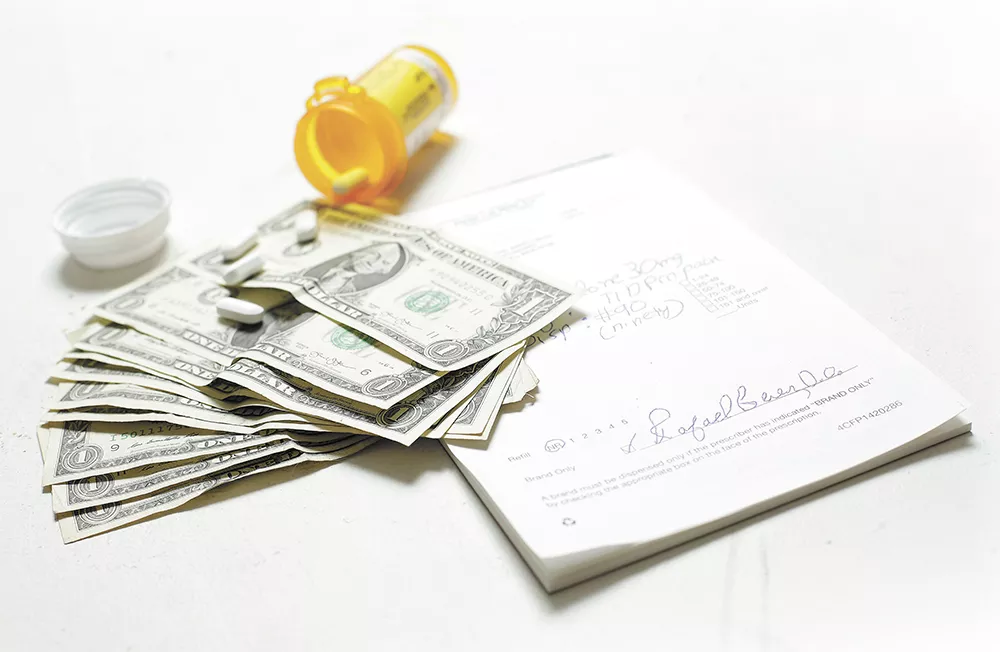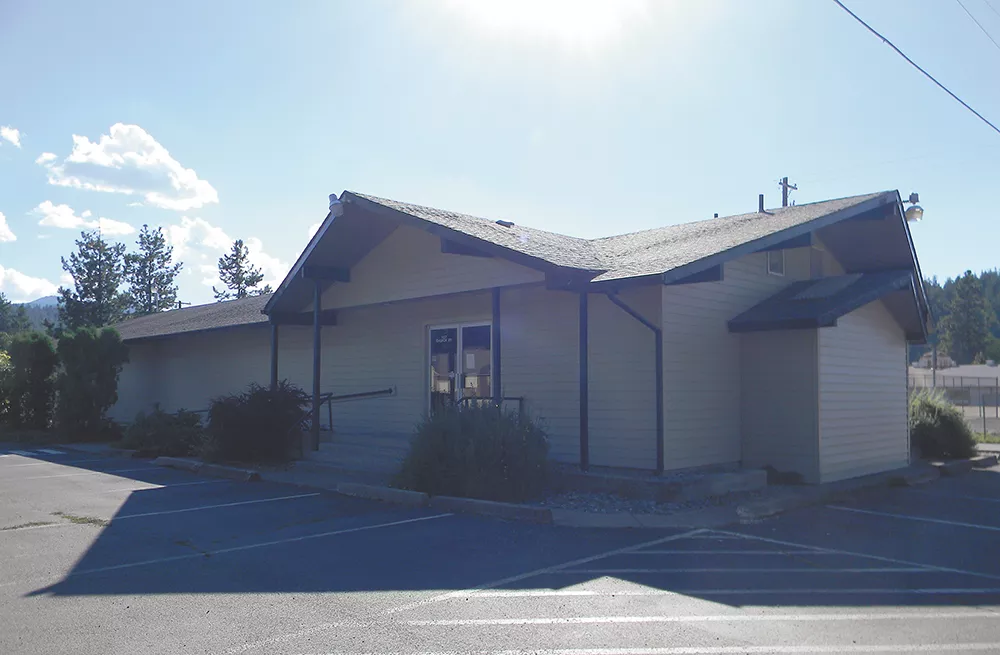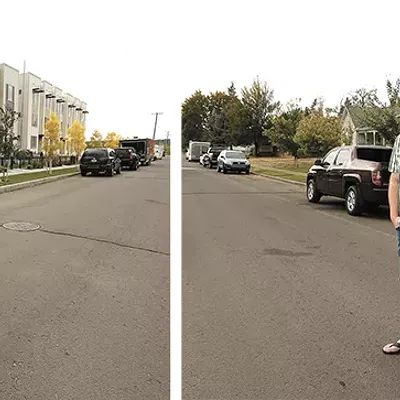
How does one person become two? Or more to the point: How does a generous, give-you-the-shirt-off-his-back country doctor become a pill-pushing drug dealer with a Hummer and cadre of strippers?
In his 62 years, Rafael Beier has been the good guy, and the bad.
On Sunday mornings, his neighbors in the pine-covered hills of North Idaho's Silver Valley would watch as the doctor, in a tidy, button-down shirt and tie, led his children off to church.
"I never had a clue what was going on," says George Watson, Beier's former neighbor, pausing in disbelief. "The whole thing is crazy. ... I just saw a regular guy."
Beier was a highly trained physician who opted to work in economically depressed areas and most recently ran a no-frills clinic in Pinehurst, a small town about 6 miles west of Kellogg.
At some point, authorities say, another Beier developed — one who spent his nights as a regular at Stateline Showgirls in Post Falls, where a dancer says he was known among employees as "Dr. Psycho," flush with cash and pills to push. He started dating a dancer in her 20s named Destiney Blaski, and through her, the doctor "ended up being introduced to a number of people he probably wishes he never met, because he felt sorry for them, badly for them," Beier's attorney would later say.
In the end, it would all fall apart. And Beier, facing decades in prison, would go on the run, fleeing from his house in Kingston, Idaho, in a Dodge pickup mere moments ahead of the feds.
Beier, it turned out, wasn't ready to give up.

COULDN'T HURT A FLY
Rafael Beier was born in East Berlin, Germany, in 1953. His second wife, Yanhua Gao, says that when Beier's parents split up, he spent some time in an orphanage before his mother married an American soldier and relocated to the U.S. when he was 6.
"People laughed at him because he didn't speak English," she says of Beier. After growing up in Kansas and Colorado, she says he attended the Kansas City University of Medicine and Biosciences, where he graduated in 1991 with a doctorate of osteopathic medicine, a degree that meant he could practice various aspects of medicine, from writing prescriptions to performing surgery.
He completed his residency at the University of Kansas and took a job in 1996 with the Public Health Service Commissioned Corps, a quasi-military federal agency that provides health services to disadvantaged communities. In that role, Gao says, he worked in Lapwai, a small town in central Idaho where the Nez Perce tribal government is located.
According to a 2004 Lewiston Morning Tribune article, Beier called the job a "dream come true," saying he enjoyed working with the tribal members. He wore his hair long and resisted wearing the corps' uniforms. The article states that although he was a good doctor, a report from the agency concluded that his "anti-authority" views made him "not suited" for the position.
Beier lost the job in 1997 after a confrontation with police outside of a Mormon church in Lewiston. According to court documents, his marriage at the time to Susan Beier was crumbling, and he started seeing Yanhua Gao, with whom he had a child.
Susan Beier (who declined to comment) got a restraining order against her estranged husband after she alleged that he became aggressive at her home, court records show. Rafael Beier had been excommunicated from the Mormon church in Lewiston, but attended a service with his infant son in hopes of becoming a member again. Susan Beier was in attendance, and the police were called.
When officers arrived, Beier insisted that the restraining order didn't apply at church. After a confrontation, Beier was taken to the ground, pepper sprayed, handcuffed and placed in the back seat of a police cruiser.
"I started yelling for help, they're killing me," recalled Beier in an account in the Lewiston Morning Tribune. He kicked out the window, claiming he couldn't breathe. In 1999, he sued the city of Lewiston. He was offered a settlement, but took his case to trial. Although he won, he was awarded only $1.
"He always said, 'I know that the government will always win and I can't trust the government,'" says his 18-year-old daughter, Rachel Beier.
He later worked as a physician on poverty-stricken Indian reservations near the Grand Canyon in Arizona, where Gao says he'd sometimes ride into the canyon on horseback to rescue hikers.
Rachel Beier says that her father always had an affinity for Native Americans and developed deep connections with the Nez Perce Tribe, members of which invited him to tribal events and gave her the nickname "Lulu." He displayed portraits of Sitting Bull and Chief Joseph in his office. She also says he displayed a quote from Chief Joseph's surrender speech: "From where the sun now stands, I will fight no more forever." Her father, she says, always felt that Native American tribes were treated unfairly by the U.S. government.
Both Gao and Rachel Beier say that he was always concerned about the less fortunate — to a fault. Rachel Beier says her father was soft-spoken, patient and never abusive. She recalls how he would stop for stray dogs and see if they had tags, and he'd dig into his pocket for change for homeless people and pick up hitchhikers — even if it made his family uncomfortable.
"I don't think my dad could hurt a fly," says Rachel Beier.
Before his legal problems, he operated a clinic in Pinehurst in the economically depressed Silver Valley. In court it was described as a "blue-collar" and "rural" practice, where his small staff kept records by hand. Gao says they took Medicaid and Medicare clients and cut breaks for clients who had trouble paying. She says Beier met patients after hours and even made house calls to bedridden people.
"All I'm gonna say is he helped me when I was homeless [and] provided food for me," says Jesse Thompson, who lives in Wallace, of Beier. Thompson adds that when his 2-year-old son was sick, Beier came to his house and took him to the emergency room and stayed with him until his fever was down. "I have nothing but respect for him," says Thompson.
But Gao says that his generosity got him involved with the wrong people.
"They used his goodness and took advantage of him," she says.

'YOU CAN TRUST ME, SWEETIE'
Rachel Beier says that around 2010, her parents started having bad fights. He told her he felt alone. Around 2012, she says she saw a change in her dad. He started hanging out with "sketchy people," she says. She remembers him staying up late, listening to pop music, wearing cologne and jewelry and buying expensive, brand-name clothes from Buckle.
She remembers her father spending more time with Destiney Blaski, who did not respond to repeated requests for comment. Rachel Beier says her father even paid for her to accompany them on a trip to Hawaii, one of his favorite vacation destinations. During the trip, Rachel Beier describes Blaski as being cold to her father.
Blaski, who was in a troubled marriage that would end in divorce, became romantically involved with Beier, and the two referred to each other as their respective "fiancé." During the trial, prosecutors stated that while Beier was living in the furnace room at his house, he signed a lease on a condo for Blaski, provided her money, paid for breast augmentation and put her on the registration for a Hummer. According to the prosecution, Beier was using his prescription pad to help pay for it all.
During opening arguments at Beier's federal trial in Coeur d'Alene, Assistant U.S. Attorney Michael Mitchell told the jury that doctors "are entrusted with the key that opens the door to medicine cabinets of controlled substances." These substances, he said, can be sold for cash on the streets.
"Dr. Beier misused his key and opened the medicine cabinet to highly addictive prescription drugs, releasing them into this community," he stated.
According to court documents, as early as 2011, Beier started writing fake prescriptions for drugs like Adderall, a stimulant that's used to treat ADHD, as well as hydrocodone and oxycodone, opioid painkillers that millions of people across the country have become addicted to.
Traci Whelan, an assistant U.S. attorney, tells the Inlander that when federal agents raided the clinic in Pinehurst, they found drawers full of thin patient files. The files, says Whelan, contained no patient background, no X-rays, no doctor's notes. Instead, she says, they contained basic or incorrect information about patients, some of whom she says never stepped foot in the clinic. The files, says Whelan, claimed that nearly every patient had suffered an ATV or snowboarding accident, and Beier had prescribed them narcotics.
Amidst the country's opioid epidemic, "pill mills," run by doctors who overprescribe addictive painkillers, have come under scrutiny.
"This was different," FBI special agent Edward Jacobson tells the Inlander. "In this case he was exchanging prescriptions for cash in a parking lot."
Despite Beier's generosity to Blaski, prosecutors described her as "not overly kind to him." There were times when Beier was not overly kind, either. Several police reports describe incidents of Beier angrily confronting Blaski over her other romantic partners.
In June of 2012, Beier pulled up in a white Cadillac Escalade in Coeur d'Alene at a place where Blaski and her boyfriend were located, according to a police report. Beier stormed out of his car and struck the man, who fought back and knocked Beier to the ground. The police were called, and Blaski told an officer what was going on.
"She was recently fired from her job as a dancer at Stateline Showgirls," reads the report. "For the last 4 years she has known Dr. Beier as a frequent customer. She has been leading him on for the past few months to increase her revenue. She explained she would let him take her on dinner dates, but would not have sexual relations with him. ... After she got fired, he allegedly started to offer to write prescriptions to other dancers for information on Destiney and her family."
Although Blaski wanted to file stalking charges against Beier, she didn't follow through, and the two would keep in contact, records show. He continued to frequent Stateline Showgirls, where employees at the club used words such as "weird" and "rude" to describe Beier, who seemed intensely focused on particular girls at the club. Some took to calling him "Dr. Psycho," one employee says.
Beier would sell prescriptions of Adderall for up to $300, according to Whelan and Jacobson. But the real money, they say, was in painkillers. Beier, they say, would sell prescriptions of 90 pills of oxycodone for $800 to dancers at Stateline Showgirls, who would be flush with cash after selling them for $20 to $40 each on the black market. According to the feds, Beier sold pills in parking lots, private homes, hotel rooms and at the strip club. Beier communicated with the girls with "burner phones," prepaid cellphones used by drug dealers because their numbers are hard to trace.
According to prosecutors, he commonly referred to the strippers as "Sweetie." "It is okay, sweetie." "You can trust me, sweetie." "Sweetie, you just don't understand."
They would text back with messages like "Let me keep putting 800 in your pocket" or "I can flip it and have more money for you by tonight."
COMING AND GOING
Amy Tosh, a Wallace resident, says that the influx of prescription pills had a severe impact on the Silver Valley. She says that Beier developed a reputation as a doctor who wrote unscrupulous prescriptions. Tosh says she watched one of her oldest friends completely change after becoming addicted to prescription pills.
"She was, in my opinion, in pharmaceutical-induced mania," Tosh says. "She was nuts."
Tosh says she heard people brag about their endless supply of meds, and she's seen more crime that she suspects is related to addiction to prescription pills.
Before 2012, Beier's only contact with law enforcement in Kootenai County was for traffic infractions. But now Beier's name was appearing in reports from the Coeur d'Alene Police Department (which wouldn't comment for this story) in connection to prescription pills or altercations with Blaski.
When Eric Blaski, Destiney Blaski's husband at the time, was pulled over, he told an officer that Beier was his doctor and had prescribed him some "hydros" that he had taken that day.
Later that fall, a concerned Walgreens pharmacist in Coeur d'Alene called the police after a man wearing a white do-rag tried to fill a Oxycontin prescription for someone who was in jail. The pharmacist told the responding officer that the prescription had been written by Rafael Beier.
"[He] has seen a lot of scripts come from this doctor with a lot of strange situations, different people picking up the scripts and large amounts of medications are prescribed every time," reads the police report from the incident. The report also states that police interviewed Fawnie Bracamonte, a former Stateline Showgirls dancer, who admitted she purchased the prescription that had caught the pharmacist's attention from Beier for $700.
Throughout 2011 and into 2013, Destiney Blaski kept getting busted for drug possession, with police finding prescription pills listing Beier as the prescribing doctor. She also reconnected with Beier, who continued to let her use his black Chevy Avalanche truck.
Then two incidents caught the attention of the feds. In December of 2012, Coeur d'Alene police received a call from the staff at the LaQuinta Inn about a white Hummer registered to Beier and Blaski.
"The clerk said the Hummer had been coming and going for short intervals at all hours of the day and night for several days," reads the police report.
When police knocked on the door, they heard a toilet flush. Inside was Bracamonte, along with Beier and Blaski. Police searched the room and found "sooty smudges on the toilet lid" in the bathroom. In the garbage, they found a blue plastic tube from a ballpoint pen that had been slightly melted on each end and had a burnt residue inside — a device, the report states, that's used to inhale vapors from ignited pills. Police used pliers to pry open a can of Mike's Hard Lemonade, where they found a metal pipe. They also found bottles of pills, with the prescriptions written by Beier.
Bracamonte spilled her guts, according to the report. She admitted crushing and smoking the pills.
"Dr. Beier will write any of the dancers a prescription for any drugs they want, whenever they want," she said.
That night, only Bracamonte was arrested. But that would change.

'PSYCHO ENOUGH'
On a warm summer night in July 2013, the relationship between Rafael Beier and Destiney Blaski collapsed for good and would give the feds enough room to finally move.
Chelsea Piper recalls it was the type of summer night when you leave your windows open. At the time, she was living in an apartment complex in north Coeur d'Alene. She never met Blaski, but says Blaski and her friends were "super flashy," drove newer cars and were the talk of the complex's other residents.
That particular night she heard angry yelling from Blaski's apartment.
"He sounded like a grizzly bear," recalls Piper.
Beier drove up to the apartment complex and loaded eight rounds into a Desert Eagle .44 Magnum, according to a police report. He popped one into the chamber and barged into Blaski's apartment. The report states she was there watching TV with another man. Blaski said that Beier pointed the gun at him (which Beier denied doing), according to the report.
When police arrived, Blaski admitted that she "used to sell pills for Rafael," who she said was "psycho enough" to shoot her.
Beier was arrested, and the officer found Staxyn, a prescription pill for erectile dysfunction, and two cellphones, one of which appeared to be a burner. The officer searched Beier's iPhone and found texts regarding a drug deal.
Beier was initially charged with aggravated assault with a firearm, which was dropped after Blaski refused to cooperate. After the incident, according to court records, Blaski and her attorney met with investigators and provided an account of how Beier sold drugs.
Around the same time, Beier appeared to have misgivings about his second life.
Rachel Beier says her father became more religious, reading the Bible and going to church. But strippers showed up at his clinic in Pinehurst, court records indicate. The clinic also was broken into and prescription pads were stolen. In December 2013, Beier contacted Coeur d'Alene police to report that Blaski was "still involved with drugs" and she had taken his truck without his permission.
He also became less willing to give out prescriptions.
"I am going to cut you off," records show he told Bracamonte. "I am concerned about you having a problem. I'm not going to give you any more prescriptions."
Bracamonte, who was sentenced in 2015 for selling pills, responded by threatening to blackmail him, records state. She would later serve as a government witness in Beier's trial.
THE SETUP
The last prescription Beier ever sold was in a bathroom stall in Coeur d'Alene in 2014. He knew the feds were onto him when they sent a confidential informant to buy drugs.
"They're about to indict me," he whispered to the informant. "I don't need to give them any more ammo."
"I never should have done this in the first place," he added. The informant told him she needed money and it would be the last time.
Beier, suspicious, demanded that the informant strip in the bathroom at an Albertson's before selling her a prescription, written for an elderly Spokane Valley woman, for 90 pills of oxycodone. However, he didn't notice the wire the informant hid in her bra.
After selling the prescription for $1,000, Beier was pulled over in his Chevy Avalanche. Police found the cash and prescription pad and arrested him for selling a controlled substance.
UNDER THE COVERS
Beier didn't give up easy. He rejected a plea offer, instead opting for a jury trial.
In court, his defense lawyer, James Siebe, argued that Beier was set up by young women who took advantage of him and sold him out when they were facing serious drug charges.
"[If] they got caught with their finger in the pie, they'd be able to pull out a plum and say, 'Hey, I got this plum from Dr. Beier, and he gave it to me. It wasn't me that was doing any of this dishonest work on the side,'" Seibe argued in court, saying the government's case was based on "snitches."
Beier had been released on his own recognizance during the trial, and on May 17 of this year — the day a jury was to decide his fate — he skipped town. Nevertheless, as federal agents began a manhunt, the jury found Beier guilty of conspiracy to dispense a controlled substance, 66 counts of distribution of a controlled substance and four counts of distribution of a controlled substance to a person under 21. (Destiney Blaski, meanwhile, underwent drug treatment and has been on probation since January of 2015.)
After her father went on the run, Rachel Beier says his family worried that he'd be killed. She says that the 62-year-old fell sick while hiding in the woods. When he came home, she says, he left camouflage fatigues stained with diarrhea on the porch.
When federal agents returned to his property on May 23, Beier was buried under a pile of blankets in a motor home parked in the barn behind his house. Agents searched the barn, leaving only the motor home, doors unlocked. Jacobson, the FBI agent, received no response from Beier after he yelled into the barn.
But after Jacobson announced he would send a German Shepherd after him, Beier emerged from the motor home, his hair frazzled, a light beard growing on his face, refusing to talk on the way to Bonner County Jail.
Sentencing originally was scheduled for later this month, but Beier's lawyer successfully argued to push it to January, so Beier could undergo an evaluation of his "mental condition," which will be taken into account. The government recently received an order to seize at least $732,800 of his assets, proceeds from selling drugs, and Beier, who is still in the Bonner County Jail, could face 20 years in prison.
While his family is hoping for a lighter sentence, they are left with one small comfort at the end of it all.
"At least we know he won't wind up dead," says Rachel Beier. "He's still alive." ♦






















